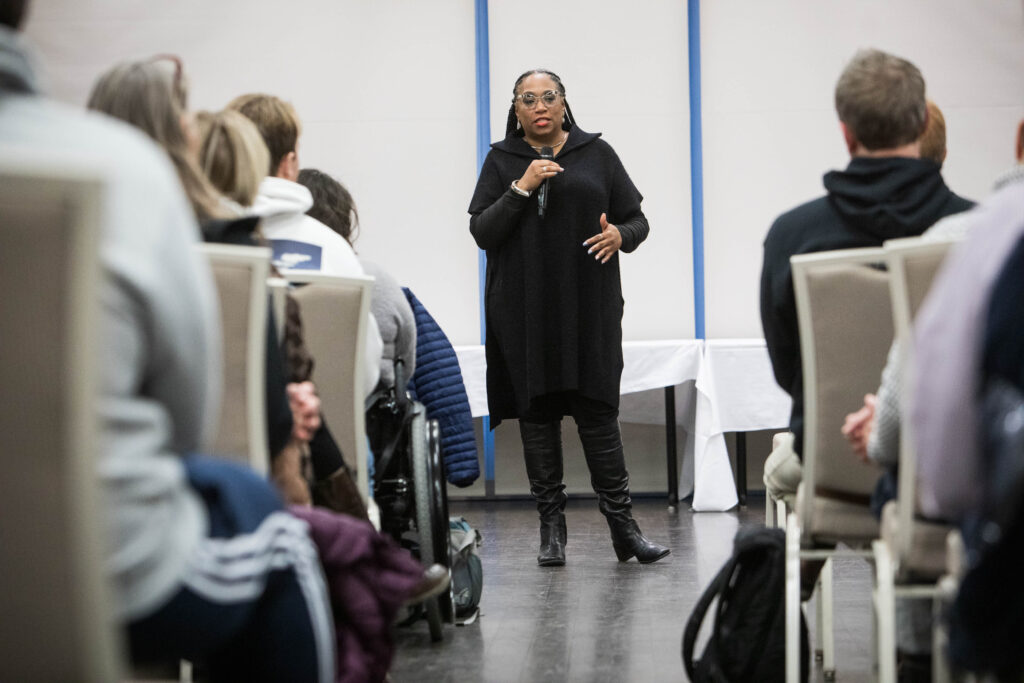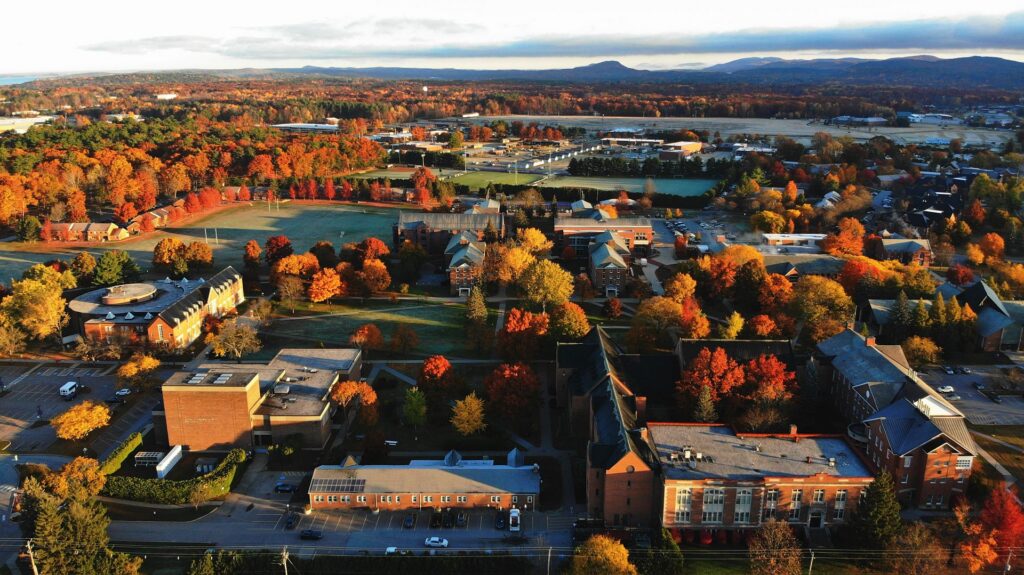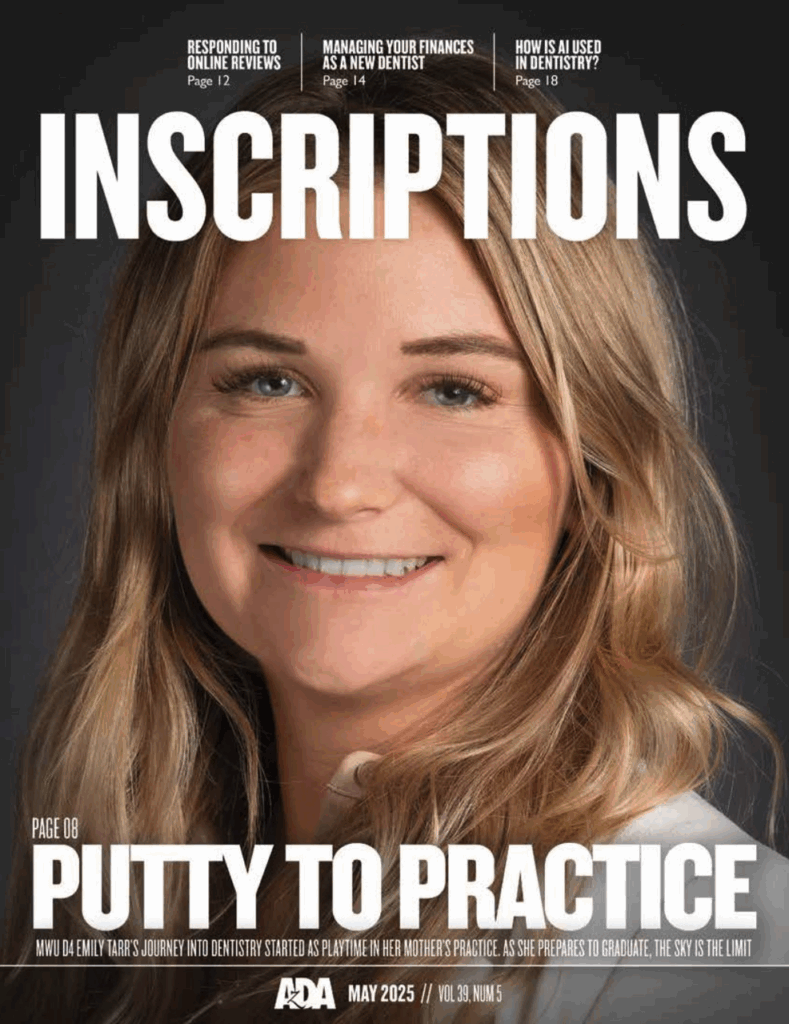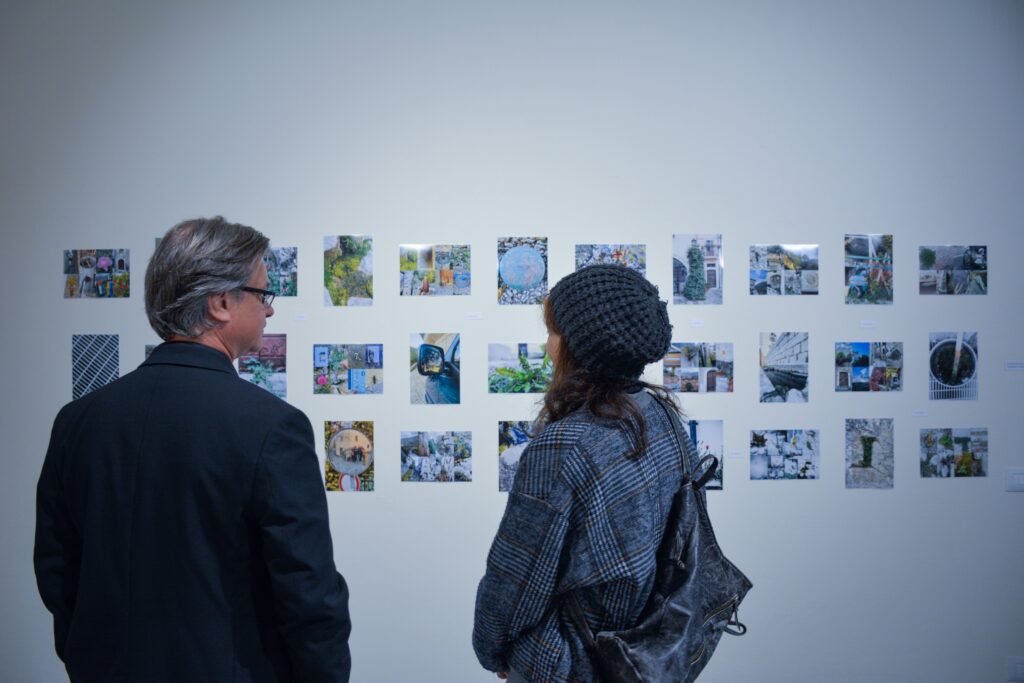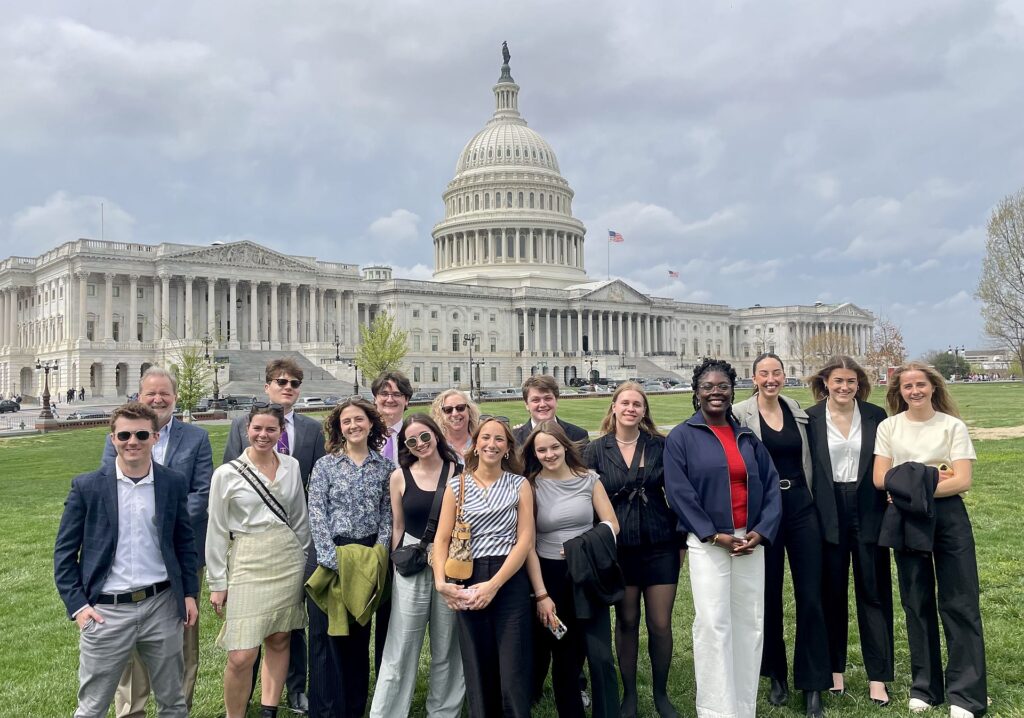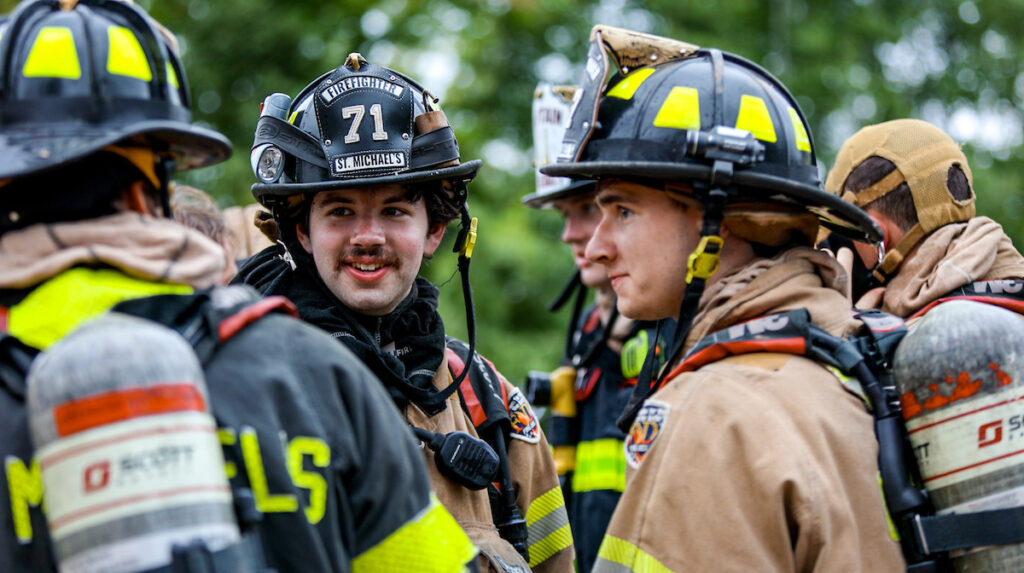This year, Saint Michael’s College devoted an entire week to Martin Luther King, Jr., and his vision of a Beloved Community during its 32nd annual Dr. Martin Luther King, Jr. Convocation and Celebration. January 15 was filled with speakers, workshops, and a community art mural letter blocked with King’s message “The Fierce Urgency of Now,” which was this year’s theme. Students from Winooski High School and Rock Point School in Burlington attended events on January 15, which ran all day long. The events continued throughout the week with a candlelight closing ceremony planned for January 19 near the cupola.
Keynote Speaker Traci Griffith, J.D.
Griffith, who taught at Saint Michael’s for more than 20 years, was greeted with a standing ovation from a packed room on January 15. Griffith, a lawyer, a journalist, an academic, and an advocate, was the keynote speaker during the Monday events. She currently serves as the Racial Justice Program Director for the American Civil Liberties Union (ACLU) in Massachusetts. At Saint Michael’s, she was a professor of Media Studies, Journalism and Digital Arts, including serving as Chair of the Department for several years. Her expertise focuses on First Amendment law and ethics as well as race and gender representation in media.
Griffith’s talk, titled “Promised on Paper, Pathetic in Practice: Race and the US Constitution Through the Eyes of Dr. King,” began with a discussion of the U.S. Constitution of 1787. 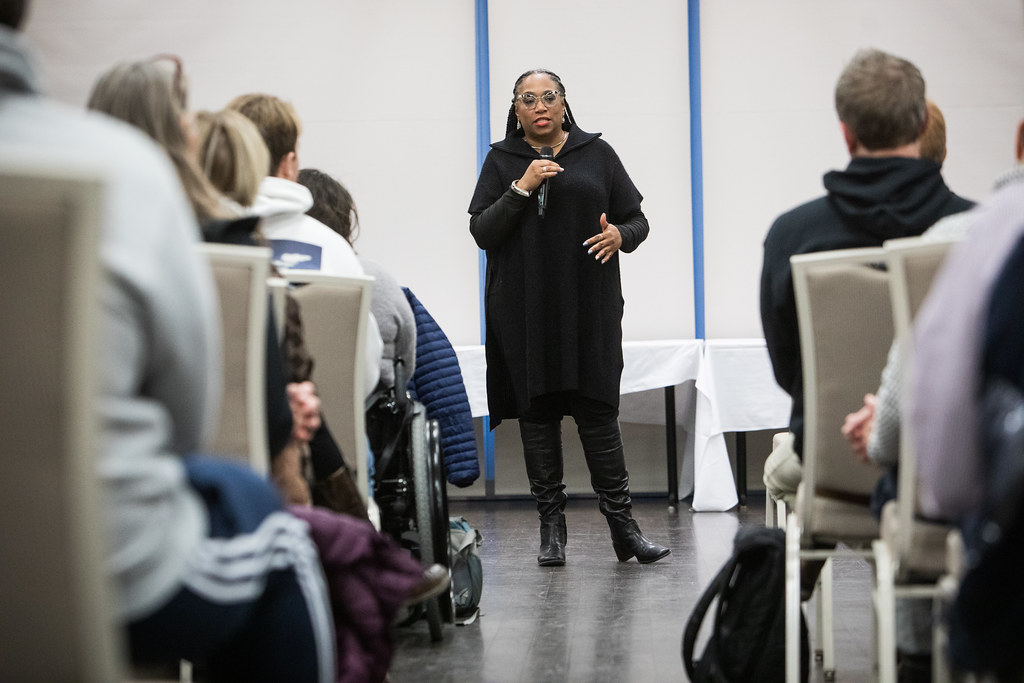
See a photo gallery by Cat Cutillo from MLK Jr., Convocation Week
“The purpose behind it of promoting general welfare, securing the blessings of liberty. Yet the existence of slavery— a very thriving institution in many states at the time of its ratification— came into direct conflict with ensuring that these goals were met, particularly for Black Americans,” Griffith said. “Time and time again, discrepancies exist for Black and Brown Americans between the rights guaranteed to them on paper and those actually granted in their everyday lives…Almost 250 years later, justice still has not been fully achieved for Americans of color even though the slavery permitting Constitution of 1787 obviously has been amended.”
While Dr. King’s “I Have a Dream” speech has become one of the most well-known refrains in telling Civil Rights history – a “King-inspired Hallmark card” around this time of year, quipped Griffith – she encouraged people to turn their attention to his lesser-known remarks about “the fierce urgency of now.”
“King said we cannot continue to give lip-service to the guarantees of life, liberty, and the pursuit of happiness,” Griffith said. “That these sentiments found in the Declaration of Independence were really a declaration of intent rather than reality. The U.S. Constitution is also part of that dream. It is an aspirational document. Whereas ‘The Fierce Urgency of Now’ is a call to action. Yes, we must reconcile our past. Our country is founded on thievery and genocide. Our future cannot begin until we reckon with our past.”
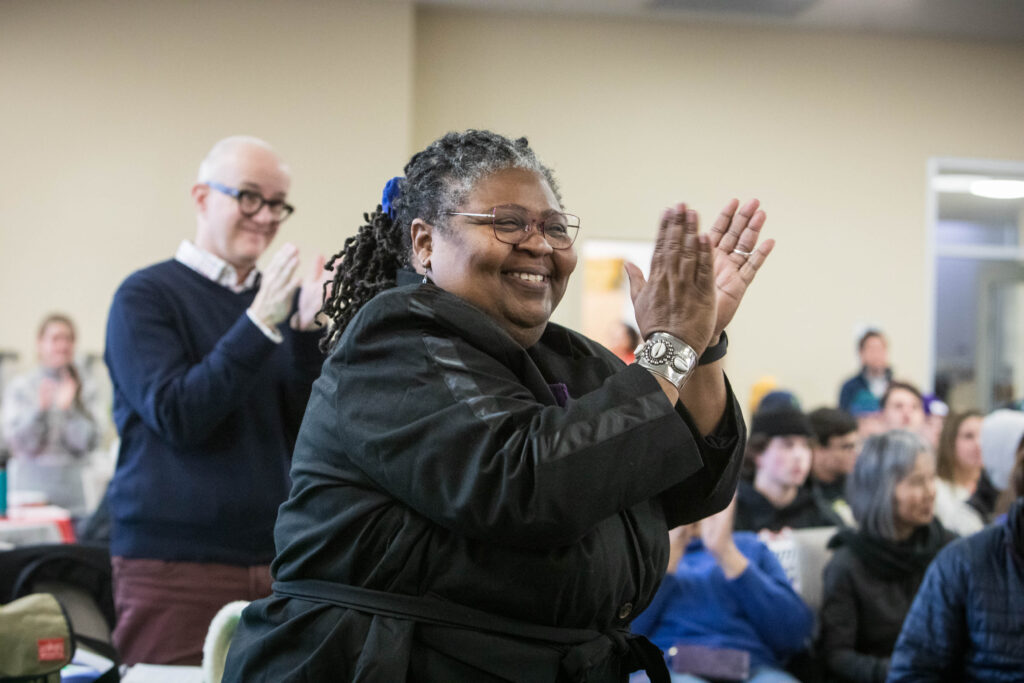
(Photo by Cat Cutillo)
Griffith gave a number of examples of how racism has continued to wreak havoc on the lives of Black and Brown Americans throughout history as it continues to do so today. She spoke about the attacks on Native Americans and expropriation of their land, slavery and Jim Crow laws, and government boarding schools that stole Native American children from their homes to “civilize and Americanize” them. Griffith also talked about the Chinese Exclusion Act instituted by the government and the establishment of Japanese internment camps by executive order.
She discussed redlining which “allowed banks to deny credit to residents of the lowest rated neighborhoods. Those neighborhoods were often Black and Brown neighborhoods,” she said, and denied Black and Brown people paths to home ownership. Griffith talked about social redlining today in Winooski and downtown Burlington. She spoke about how the “superficial remedies imposed to placate marginalized communities and soothe the conscience of well-meaning progressives are not enough to effectuate actual change.”
“We all remember those superficial platitudes that came about after the racial reckoning of 2020,” Griffith said. She referenced the major companies who created new DEI positions, racist stereotypes that were removed from logos, schools that were renamed, and statues that were toppled.
Four years later, she said places in the U.S. have banned certain books and Drag Shows and the U.S. Supreme Court overturned Roe v. Wade and ended affirmative action- examples she cited as a continued attack on civil rights.
“The urgency of now requires us to demand justice in our own spheres of influence,” Griffith said. “Martin Luther King, Jr. said ‘Human progress is neither automatic nor inevitable. Every step for the goal of justice requires sacrifice, suffering and struggle, the tireless exertions and passionate concern of dedicated individuals.’ Do you feel the urgency of now?”
Additional Speakers on January 15
Jolivette Anderson-Douoning, Ph.D.
Anderson-Douoning is the Edmundite Scholar in Residence for the History Department and teaches “The African American Experience, 1619 to the Present” at Saint Michael’s. She teaches the same course at Winooski High School to students enrolled in a dual enrollment program, which gives them college credit for the class with Anderson-Douoning. Anderson-Douoning uses her personal history to teach and encourages students to find themselves in history.
Anderson-Douoning opened her talk and workshop by posing the question, “Is it possible for a group of people to have no history? Specifically, is it possible for Black people, people of African descent in the United States and other parts of the world, to have no history?”
“My people were slaves. And my people were free,” she said. “I come from the place and the people many of us have been taught to believe have no history.”
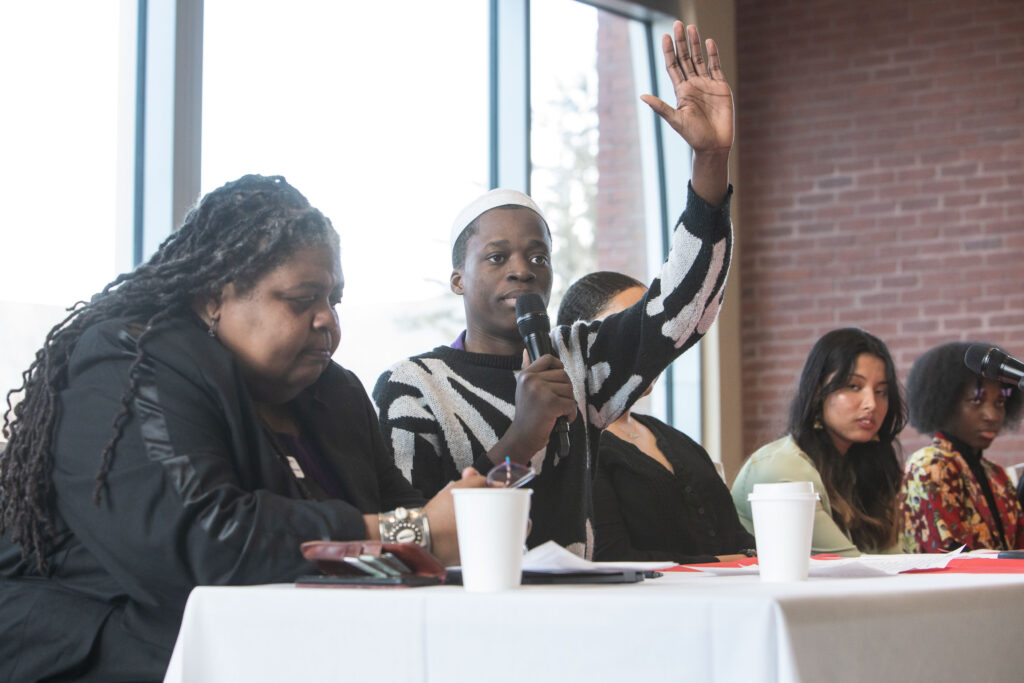
Jolivette Anderson-Douoning with her Dual Enrollment students from Winooski High School (Photo by Cat Cutillo)
A panel of Anderson-Douoning’s students from Winooski High School spoke at the event. They shared what they had studied during the semester and wove in their own personal history to harness the power of their learning.
“In my beloved community, we speak because we’re in pain. We speak because we’re hurt. We speak because we believe our voices are powerful and can reach the hearts of those who want to see change,” said one senior from Winooski. “We believe Black people are part of the constitutional people and deserve to be treated as equal as white people.”
Rebecca Haslam, Ph.D.
Haslam is Assistant Professor of Education and Coordinator of the Racial Equity and Educational Justice Graduate Certificate Program at Saint Michael’s. She gave a talk titled “Beloved Community, Universal Design, and Mattering: From Values to Action.”
Haslam spoke about “navigating systems that we all know are not designed for everyone’s full success.”
“We’re part of, we belong to, we’ve invested in and even love institutions that we know are oppressive,” Haslam said. “And we care about people and are responsible for people who are navigating oppressive systems in our care.”
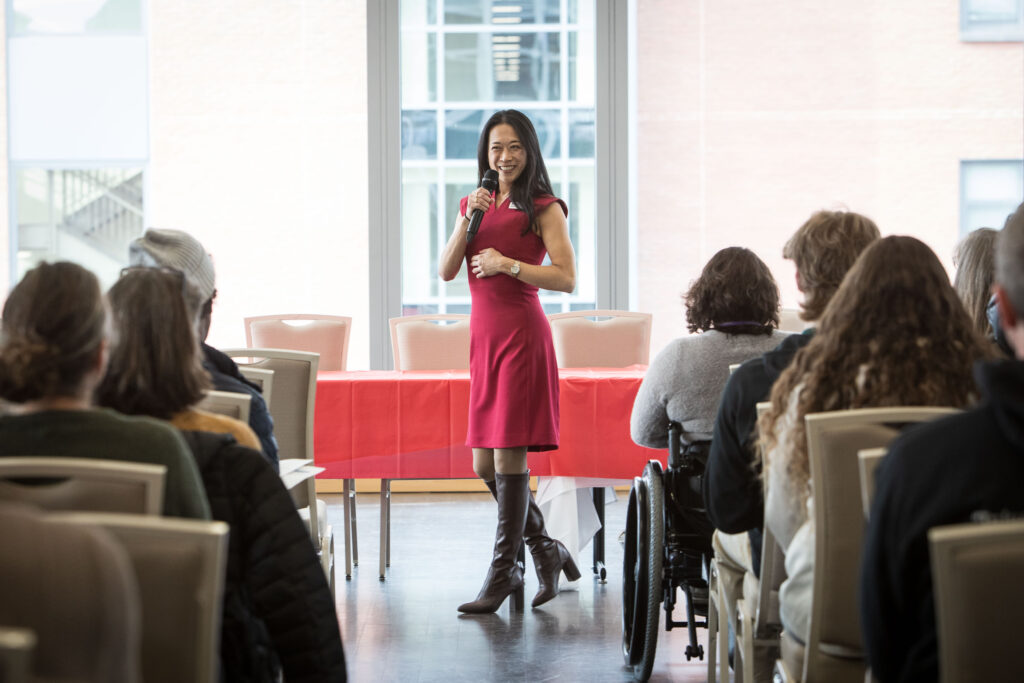
Rebecca Haslam speaking (Photo by Cat Cutillo)
As a warmup, she posed a question, asking the audience think about someone who makes them feel like they matter and share it with the person seated next to them. She then asked the room to talk about what qualities from that individual they can replicate to make sure other people know that they matter.
“Mattering can be a huge motivator for our behavior,” Haslam said. Haslam showed research from the Universal Design for Mattering which “aims to change the design of the environment rather than to change the learner.”
“In a Universal Design for Mattering framework, the people furthest from justice or folks experiencing oppression, are not solely responsible for their own liberation. Or their own lack of success, frankly, in their broken systems” Haslam said.
Omara Rivera-Vázquez, Ph.D.
Rivera-Vázquez is the Director of the new Center for Equity and Justice at Saint Michael’s. She explained that she wanted her workshop to be a listening session focused on gathering the audience’s thoughts and ideas around the work ahead for the new Center.
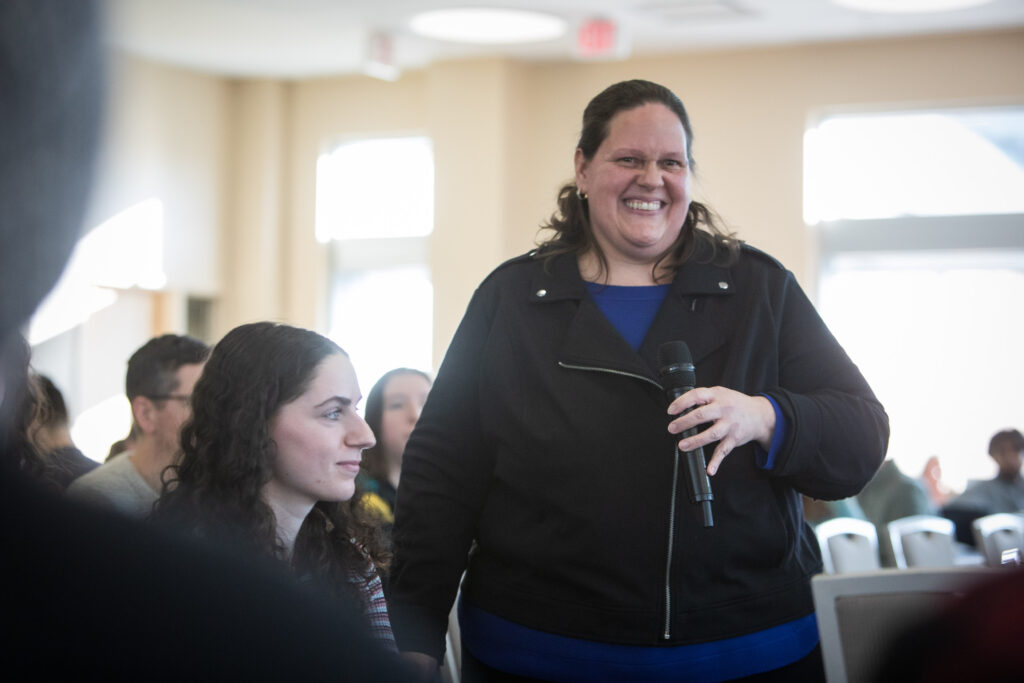
Omara Rivera-Vázquez speaking (Photo by Cat Cutillo)
“One specific issue that I’ve been passionate about and have been advocating for in Vermont is the issue of language access,” Rivera-Vázquez said.
Rivera-Vázquez explained that a goal of the Center will be to focus on social justice issues and also advance DEI work with faculty members to continue to support curriculum development and academic programming that respond to the institutional mission.
Rivera-Vázquez asked the audience what their dreams were for the new Center. Audience answers included hoping the center will be involved in community work and suggesting it be incorporated into First-Year Seminars, responding to bias incidents on campus, fostering a connection between student voices and faculty voices, and empowering students.
Rivera-Vázquez invited people to stop by the Center, located at 243 St. Ed’s.
Student Perspectives Panel
Sarah M. Childs, Ed.D., Director of the Center for Student Diversity, Empowerment, and Community, and Katherine Kirby, Ph.D., Associate Professor of Philosophy and Director of Global Studies, co-moderated a panel of three students as the final session of the day. The panel discussion called, “The Fierce Urgency of Now Through Student Perspectives” featured students Yara Qashou, Chayma Bouzenag, and Juneau Rich ’24.
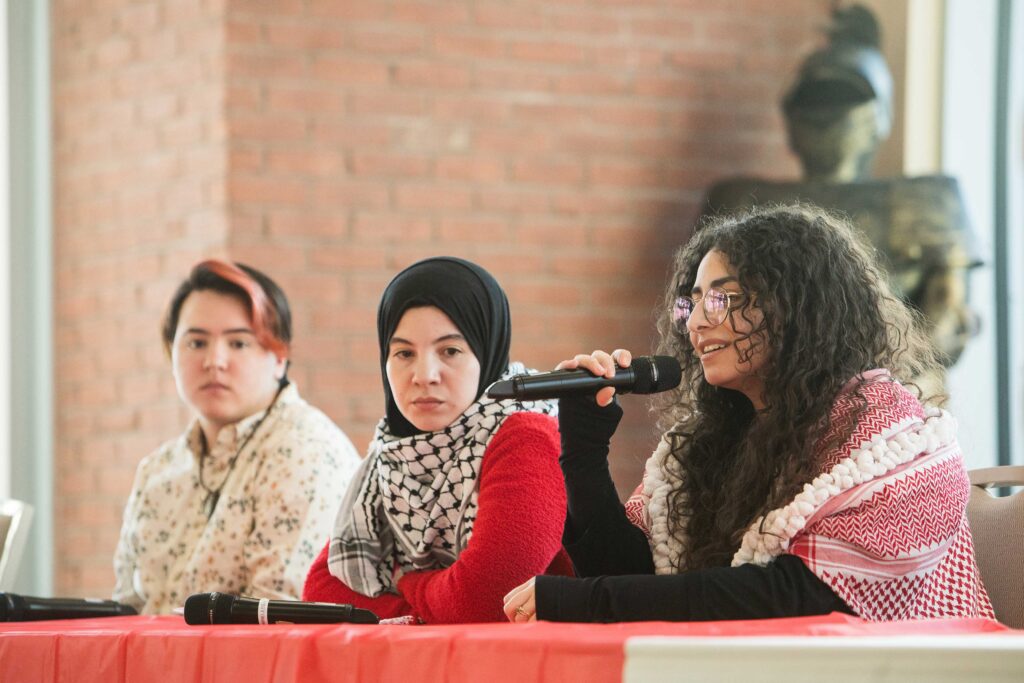
Students Yara Qashou, Chayma Bouzenag, and Juneau Rich ’24 (Photo by Cat Cutillo)
Qashou spoke about personal perspectives on recent events in Gaza and Bouzenag spoke about anti-Arab and anti-Muslim sentiments linked to Palestinians and Gaza. Rich spoke about anti-LGBTQIA+ bills in the U.S. and its ties to education and school curriculum.
Childs asked the panelists questions and then took anonymous questions from the audience that were written on paper. For the first question, Childs asked the panelists to share what matter they personally believe was the fierce urgency of now.
“The matter which I believe is the fierce urgency of now that’s really happening is the ongoing bombing and killing of my people in Gaza, Palestine,” Qashou said.
“When something like this is happening to people from your ethnicity you actually feel the most horrible feeling,” Bouzenag said. “For me, the urgent matter would be for people to actually recognize their power, to recognize that they have been internalizing biases against certain groups of people, certain minorities.”
Rich, the president of student group Common Ground, detailed some of the current anti-LGBTQIA+ bills that have been passed – or attempted – as well other actions meant to erase the voices of LGBTQIA+ community members, such as banning drag shows and drag story hours or banning certain books in schools.
“We’re in a time when I feel like we’re going backwards and it’s not safe to be of a queer identity,” Rich said.
Community Art Mural letter blocked with “The Fierce Urgency of Now.” **NEW THIS YEAR**
New this year, a community art mural was spearheaded as a collaboration between the MLK Society and the new Creative Commons Club in the Art Department, led by Art majors Magnolia Sinisi ’24, Izzy Kolb ’24, and Jack Hurley ’24. The artists outlined “The Fierce Urgency of Now” in large block letters and created a paint-by-color community art project.
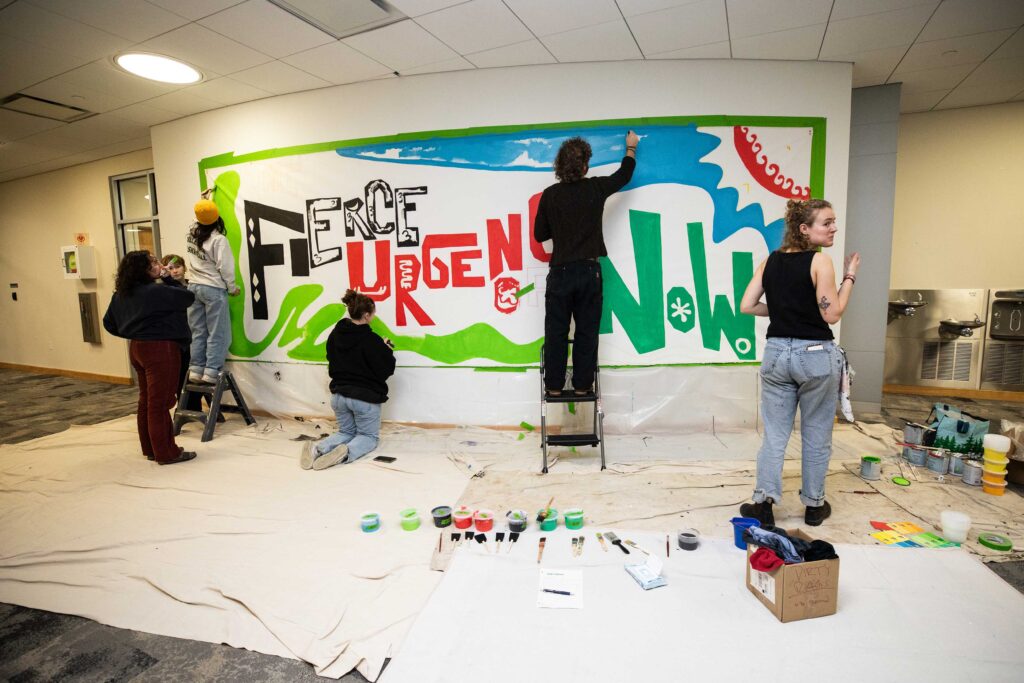
The Fierce Urgency of Now community mural (Photo by Cat Cutillo)
The mural is hanging on the 2nd floor of Dion with plans to remain on the wall through Black History Month. The goal was to present that theme phrase in “a powerful, attention-grabbing, artistic way” using creativity and relating it back to its roots.
Designed by Sinisi, the word’s colors are those of the Pan-African flag— green, red, black, and yellow. The group researched Black artists like Cymone Wilder to create the typeface lettering. The mural has been open to the community to participate in painting every evening this week.
“We wanted it to be not just our project but the community’s project,” Sinisi said.
MLK Convocation events that continued throughout the week
Promoting the Black Experience in Outdoor Activities
Eben Widlund, Director of the Adventure Sports Center at Saint Michael’s, facilitated a discussion about the Black experience in outdoor
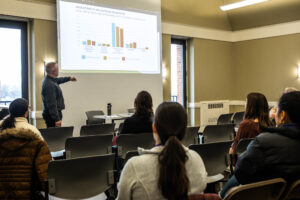
Eben Widlund shows data (Photo by Cat Cutillo)
activities. Yasamin Gordon, Volunteer Leader for the Vermont Network of Outdoor Afro in Vermont, was scheduled to speak but was unable
to ultimately attend.
The group watched video clips with interviews from Black adventurers who repeatedly noted that participating in many outdoor activities is not a pastime where many people of color feel welcome. Widlund also projected data showing that people participating in outdoor recreation are overwhelmingly white.
“The notion of going outside in its inception is incredibly privileged,” James Edward Mills, a Black freelance journalist and author of “The Adventure Gap: Changing the Face of the Outdoors” said in one video.
Edmundite Legacy: Leadership as Learning
Thoughts on Justice, Mercy and Love Concerning Vermont Refugees
Sarah M. Childs, Ed.D., Director of the Center for Student Diversity, Empowerment, and Community invited Molly Gray, Executive Director of Vermont Afghan Alliance, and former Lt. Governor of Vermont for a community conversation. Childs and Gray both shared their early childhood backgrounds and asked each other questions around Vermont refugees.
Gray shared that she grew up in Orange County, Vermont, on a vegetable and dairy farm in “White, white, extra white, extra rural Vermont.”
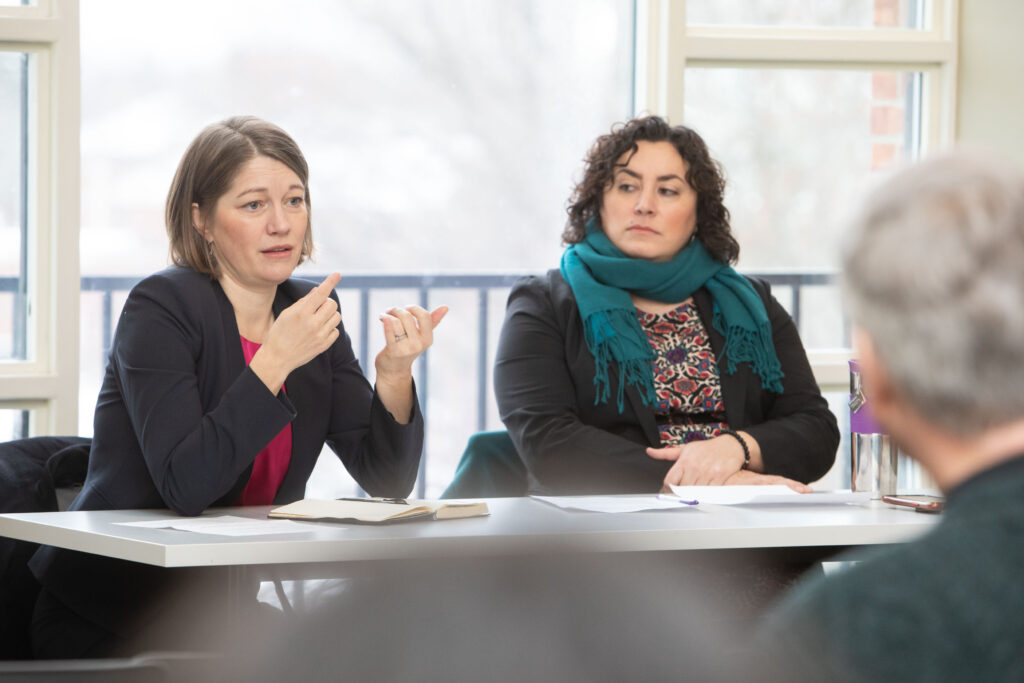
Molly Gray and Sarah M. Childs (Photo by Cat Cutillo)
She said Vermont has more than 300 Afghans living in the state and Gray helped launch the Afghan Alliance in the winter of 2021/22, which helps resettlers with things like driving lessons, employment, and basic needs like finding insurance. Gray said she will step back in the next year and the nonprofit will be an Afghan-led organization.
“The principal of doing no harm is really important,” Gray said. “Trying to understand what someone else’s need is and not what you think the need is or what you think the solution is.”
Childs shared that she grew up in Tucson, Arizona, 60-miles north of the Mexican border. She grew up with her Mexican and Chinese family and moved to Vermont in 2013 to attend a master’s program at UVM.
Childs talked about her experiences with being on the Spectrum Youth and Family Services board for six years, her relationships with her Iraqi neighbors, hosting a family, and tutoring New Americans.
“You have to train people to work affectively with language learners. It requires skill and cultural understanding,” Childs said. Childs said an organization’s effort to include more resources often resemble a home that you “casually slap on an addition” to instead of going back to the blueprints to “figure out how it all works together.”
“Things need to be done with great attention and thoughtfulness. Efforts need to be woven throughout an organization and processes— not just adding one more thing on,” Childs said.
An event Friday to close out the weeklong celebration was held after publication of this story. The event, which was planned to be held inside instead of near the Cupola due to cold weather, was expected to feature Fr. Michael Carter, S.S.E., of Edmundite Campus Ministry and music by Ryan Hay of MOVE.
Editor’s note: In the summer of 2024, the Center for Equity and Justice was rebranded to the Institute for Equity and Justice. This story was published before the rebrand and, thus, bears the previous name

For all press inquiries contact Elizabeth Murray, Associate Director of Communications at Saint Michael's College.
